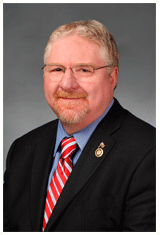| Legislative Column for the Week of May 4, 2015 |
When Compromise Isn’t the Answer |
|
“Compromise” is a frequently used word in the world of politics. It’s also the means by which almost every piece of legislation, other than the simplest bills, gets passed. While there are many benefits to compromise, there are also plenty of instances when compromise does more harm than good — when at the end of the day, one side clearly got the short end of the stick. This week, the Missouri Legislature passed one very large compromise in the form of House Bill 42: the student transfer bill. Unfortunately, the clear loser of HB 42 is Missouri’s rural school districts, who will once again be expected to do with less, so urban schools can have more.
On Tuesday (5-5), the Missouri Senate echoed the House when it voted to pass HB 42. I was one of 11 senators who voted against it. The original intent of HB 42 was to address the issues facing a very small number of unaccredited school districts in the St. Louis area, resulting from thousands of students transferring out of their home districts in hopes of getting a better education. In addition, the students left at the unaccredited schools are essentially being denied access to a quality education — something every child deserves.
Unfortunately, what started as a well-intentioned bill, a bill I voted for just a few weeks ago, has evolved into a misguided effort that I can no longer support. At the heart of the problem is language expanding charter schools and virtual schools in unaccredited school districts in St. Louis County, St. Louis City and Jackson County. The lawmakers who lobbied for this expansion argue that students in unaccredited districts will have more options when it comes to receiving their education. While that may be true, it will come at the expense of every school district in Missouri, most especially our rural districts.
Despite my opposition, and that of my colleagues, House Bill 42 is on its way to the governor’s desk for his consideration. I sincerely hope he looks at all the potential consequences of enacting this legislation and vetoes the measure. While there are currently enough votes in the Senate to override the governor’s veto (only 23 are needed), HB 42 passed by a vote of 85-71 in the House: nowhere near the 109 votes needed to successfully override a veto.
In other news, on Thursday (5-7), the Legislature truly agreed to and finally passed Senate Bill 5, which modifies what’s commonly known as the Mack’s Creek Law. For the second time this week, I found myself in the minority of members who voted “no.” In fact, I was one of just three senators, all from rural districts, who voted against SB 5.
The entire state is being subjected to legislation originally designed to address an urban issue: in this case, St. Louis County, where a number of municipalities have been using abusive traffic enforcement practices in order to bring in more revenue and pad their budgets.
The Mack’s Creek Law currently states that any city, town or village must send revenues from traffic violations in excess of 30 percent to the Missouri Department of Revenue to then be distributed annually to the schools of the county in which the revenue was generated. Under the provisions of SB 5, effective Jan. 1, 2016, the 30 percent threshold would be reduced to 20 percent.
An earlier version of Senate Bill 5 actually called for the threshold to be reduced down to 10 percent. For small, rural communities, which usually have considerably less in their bank accounts than their city counterparts, the original bill would have had a devastating financial impact. That is why I proposed the language keeping the cap at 20 percent instead. Had the scope of SB 5 been limited to modifying the Mack’s Creek Law, simply reducing the threshold from 30 percent to 20 percent, I could’ve voted for it. Unfortunately, language was added prohibiting municipal courts from issuing an additional fine for the failure to appear for a municipal charge.
While it was certainly not the intention, this one provision will serve as a disincentive for people to show up to their court date. The court cannot distinguish between someone who didn’t show up because of a work or family obligation versus someone who just didn’t feel like going. Without the possibility of an additional penalty, why would anyone bother to expend the time and energy to go in the first place? In the end, and even after getting the 20 percent cap, I did not feel as though I could vote for Senate Bill 5.
If you have any questions or comments about this or any other matter regarding your state government, please feel free to contact me at (573) 751-1503; you are also welcome to e-mail me at jay.wasson@senate.mo.gov.
|



